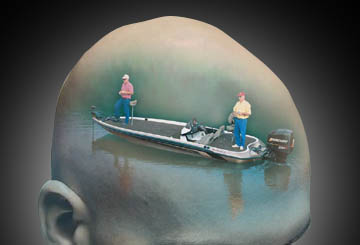Pro pointers No. 1: Anger management

It’s one thing for me to tell you what performance psychology says about mental variables affecting your fishing. However, it’s another thing altogether to hear what top professionals say matters to them. As you have read here before, I have been fortunate to fish with several successful tournament anglers (the picture that accompanies this column was taken from the back of Tommy Martin’s boat on Sam Rayburn in eastern Texas), and I have heard their stories as they struggle with the mental side of fishing.
In the next few months, I’m going to let you in on what competitive anglers have told me about how performance psychology variables play out on the water. Because of my profession, I am constrained by confidentiality principles and statutes; so unlike my journalist colleagues, I can’t tell you who said what. Nevertheless, the stories you are about to read are true – the names have been deleted to protect the psychologist!
Anger episodes
When it comes to monitoring and managing the many emotions tournament anglers experience, anger can be both very easy and very difficult. That is, it’s very easy to notice when someone else is getting angry, but often difficult to recognize, harness or redirect anger in yourself.
A “rising star” angler tells this story of watching a top competitor disintegrate intellectually, emotionally and behaviorally as his anger slowly got the better of him. “We were fishing a regional event a few years back, and I was a nonboater. Clearly this guy was under pressure from the get-go,” he recounted. “As the morning unfolded, I caught a couple of nice fish, while the guy in the front made a few mistakes and lost some fish.”
Each lost fish, however, made him madder and madder. Eventually his casting accuracy, his presentation skills, his hook-setting efficiency and his fish-landing talents went down the tubes, along with his emotional equilibrium.
“Even more amazing was watching this guy’s decision-making skills deteriorate as he became progressively more angry. We began frantically running from one area to the next, sometimes only staying for a few moments before he impulsively, angrily pulled the trolling motor and raced off to the next spot.
“At that point I began to think about how many times I probably have allowed my anger to take control and ruin my day. I guess I’d never noticed it in myself, but it sure was obvious watching it happen to someone else.”
The psychology of anger management
For a number of years, popular psychology championed the idea that the best way to deal with anger was to “let it all hang out.” Anger management classes encouraged people to “get in touch with their anger,” and this often involved yelling, pounding on pillows and screaming at imaginary people in the guise of “therapy.”
We know now that getting angry leads to getting more angry, and the “let it all hang out” movement has thankfully died away. The best approach to dealing with angry feelings, psychology research tells us, is to replace angry feelings with other more adaptive emotions. Being angry and being relaxed, for example, are physically incompatible; you can’t be angry and relaxed at the same time.
However, it’s pretty hard to avoid an initial angry reaction when your trolling motor fails at 7:30 in the morning, or when the guy you knew was shadowing you in practice jumps your best spot on tournament day! Nearly everyone’s first response will include words you won’t find in the church bulletin. However, it’s not your first reaction that matters most; it’s the next three or four reactions.
It’s like when you set the hook on a big bass. No one – not you, not Larry Nixon, not Jay Yelas – can stop that fish from jumping the first time. But a great angler will almost always take control and prevent that fish from jumping again, right?
Same way with anger. If you break the line on a big fish, your initial reaction could easily be an angry-frustrated-emotional outburst. OK, fine. No harm in that. However, after your initial involuntary reaction, you have choices to make.
Is your next move to get more angry, perhaps to the point where you break your rod, or do you decide to take a few deep breaths, then check your line for weak spots and/or replace it? Do you let yourself stay angry, or do you treat this situation as another problem to be solved in a calm, practical way?
Angry feelings are universal and unavoidable; they, like bass, come to the surface now and then for everyone. Whether they stay there or get replaced by adaptive feelings and constructive behaviors is what makes all the difference.

————————————————–
Jay T. McNamara, Ph.D., L.P., also known as Dr. Fish, recently finished his book “The Psychology of Exceptional Fishing.” You can order it by contacting Jay via e-mail at this address: [email protected].
————————————————–
Jay T. McNamara, Ph.D., L.P., is a psychologist, who is also an avid bass and walleye angler. With more than 26 years of professional experience complemented by participation in competitive fishing at local and national levels, he is uniquely qualified to illustrate how performance psychology principles apply to tournament fishing.